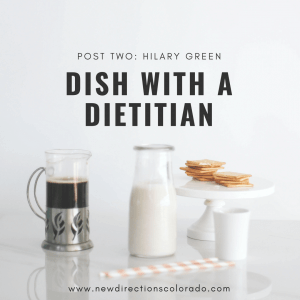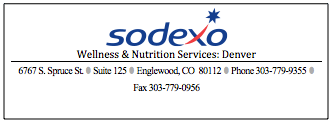Having A Balanced Diet | Dish With A Dietitian

As many of my clients know, I strongly suggest working with a registered dietitian during recovery. Some questions that surface during session that can be better answered by a dietitian rather than an eating disorder therapist. Dietitians are an integral part of an eating disorder treatment team. Registered dietitians are educated about not only food but also the way nutrition interacts with our unique bodies along with how nutrition can help improve our overall wellbeing. Having a balanced diet can feel cumbersome if you are not a registered dietitian!
Each month, New Directions Colorado features a local dietitian to help answer various questions you have. The goal of these blog posts is to familiarize yourself with local dietitians, have additional recovery resources and to ask questions in a format that may feel less intimidating before scheduling an in-person session with them.
Another piece to recognize is that you are tasked with finding the right fit in a provider (i.e. mental health therapist, dietitians, psychiatrists and medical doctors) for your unique goals and needs. Not all providers will be a good fit for you. We completely get that and want you to be successful in your recovery. Listen to your intuition on the right fit. Now, let us move forward to today’s guest dietitian!
Hilary Green, RDN | Sodexo Nutrition

Denver Registered Dietitian Nutritionist and Certified Diabetes Educator helps answer questions from clients who struggle with eating disorders and disordered eating.
Is eating really this difficult? I feel like I need to be a dietitian to learn how to eat. How can I learn nutrition basics without overcomplicating it or following a diet?
I know! Every time we turn around there is a new fad diet on the market or a new best food/worst food list. Eating does not have to be as difficult as the media and social media make it out to be. First of all, diets don’t work! Eating a variety of foods in a variety of colors is the best way to get good nutrition as well as all of your vitamins and minerals. I know it’s not the newest craze, but eating everything is really the best way to stay on a nutritious eating plan.
How does overall nutrition help me? (i.e. growth of hair, skin, nails and bones, energy, sleep, etc.)?
Nutrition helps us in our everyday lives, being able to have the energy and the physical wellbeing to do the things we want to do. That’s why it’s so important to eat a variety of foods, because they all offer our body different benefits. For example, if you’re not getting enough carbohydrates you might feel foggy or have a hard time concentrating since your brain requires them as fuel. If you’re not getting enough protein, you might feel fatigued or start to notice hair loss and muscle wasting. Same with vitamins and minerals. If you’re developing a deficiency in a particular vitamin or mineral you may start noticing aching bones, extreme fatigue, hair loss, brittle nails, poor body temperature regulation, depression, changes in your neurological function, etc.

I hear eating every 3-4 hrs is helpful for my body. I still struggle with snacks. What should I look for in a snack? For example a protein + carbohydrate.
Yes, eating every 3-4 hours helps keep your metabolism burning throughout the day and sustains your energy. Snacks can be tricky. Try to avoid any trigger foods that you may not be able to control your portions. For example chips, crackers, nuts, etc. Snacks like that can be measured out ahead of time to help control the portions.
Ideally you always want to include a protein with a carbohydrate for your snacks. The protein can help your body absorb the sugar from the carbohydrates at a slower rate so you don’t get the highs and lows in your energy that you might get from straight carbohydrates. Fiber is the other thing that is important in carbohydrate absorption. Higher fiber carbohydrates such as fruits, veggies, and whole grains will also prevent the highs and lows that refined carbohydrates can cause. Some snack ideas include:
Apple and peanut butter
Grapes and cheese
Veggies with hummus
I’m in eating disorder recovery and when I found out I was pregnant, the doctor gave me a list of “do not eat” foods. How can I eat during my pregnancy without restriction? I do not want my eating disorder to relapse.
Because of the high risk of food-borne illnesses to pregnant women, some foods that might be more susceptible to causing food-borne illnesses are not recommended. It’s important to talk to your doctor about what foods would put you at highest risk and what foods are minimal risk according to the list that they give you. There might be ways you can still incorporate some of these foods by cooking them a certain way or having more control over the setting you eat them in. For example, it’s not recommended for you to eat creamy salads that have been sitting out at a BBQ, but you could have some of these foods if they are prepared and eaten at safe temperatures.
A dietitian can also help you figure out alternatives to some of your favorite foods that might not be recommended during your pregnancy so you don’t feel deprived or like you are dieting.
What is in your shopping cart?
My shopping cart has a variety of foods, some frozen, canned, fresh, different types of produce, seasonings, sauces, and even some items society deems as indulgences. I try to think about what sounds good to me for the week and try to modify it to be more balanced. This way I don’t feel deprived, but I still get a good mix of protein, carbohydrates, fat, and plenty of vitamins and minerals. I try not to bring my trigger foods home and instead will enjoy them once in a while by going out to get them. This way I can enjoy them distraction free knowing that I will not be tempted to overindulge taking away from the joy that I find in such foods. Again, everything in moderation!
HILARY’S EXPERIENCE
Hilary Green earned her bachelor’s degree at Colorado State University and completed her post-graduate work through the VA Healthcare System in San Diego, California. Hilary is accredited by the Academy of Nutrition and Dietetics for Nutrition Counseling and Education, as well as through the National Academy of Sports Medicine for Personal Training. Hilary has also done consulting and assessment work in nutrition and exercise. As a Registered Dietitian, Hilary specializes in health coaching and outpatient issues including bariatrics, weight management, and diabetes. She is a certified diabetes educator.
Creating Your Treatment Team
To find out more about adding Hilary to your eating disorder treatment team, check out Sodexo Wellness & Nutrition Services: Denver. Hilary Green can also be contacted via phone at 303-779-9355 or by email at Hilary.Rounds@Sodexo.com

If you or someone you know is suffering from an eating disorder, contact an eating disorder therapist right away. Call 720-306-1631 to set up your free 30 minute consultation, where we can check in with what’s present for you and you may ask a trained eating disorder therapist any questions you might have. You may also learn more about eating disorder therapy offered by New Directions Colorado, here.
© Erica Faulhaber 2018 – This blog may be shared or reprinted as long as the information is unedited and the author bio, including contact information is printed along with the blog.
 Erica Faulhaber PhD, NCC, LPC, CEDS, EMDRIA Approved Consultant and Certified EMDR Therapist. She is a therapist in Erie, Colorado who helps women struggling with trying to be perfect all the time. New Directions Colorado, is a therapy practice that specializes in eating disorders/disordered eating, trauma and Eye Movement Desensitization and Reprocessing (EMDR).
Erica Faulhaber PhD, NCC, LPC, CEDS, EMDRIA Approved Consultant and Certified EMDR Therapist. She is a therapist in Erie, Colorado who helps women struggling with trying to be perfect all the time. New Directions Colorado, is a therapy practice that specializes in eating disorders/disordered eating, trauma and Eye Movement Desensitization and Reprocessing (EMDR).
Leave a Reply